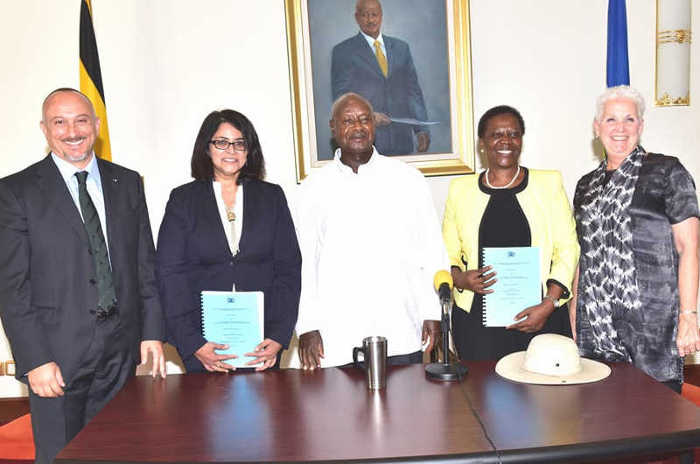Business
Uganda Oil Refinery Deal Finally Sealed

(Left to Right) Italian Ambassador to Uganda Domenico Fornara, President of YAATRA Africa Rajakumari Jandhyake, President Museveni, Muloni and US envoy Deborah Malac
Uganda has finally signed an agreement with a group of private companies to develop, finance and build, and manage the highly anticipated Oil Refinery in Hoima, in Western Uganda.
The so-called Project Framework Agreement was signed between the government of Uganda and the Albertine Graben Refinery Consortium (AGRC), a consortium of four companies.
The members of the AGRC consortium are; YAATRA Africa form Mauritius, Lionworks Group Limited also from Mauritius, Nuovo Pignone International SRL, an offshoot company located in Italy but owned the US giant General Electric. The four member of the consortium is SAIPEM SPA from Italy.
The signing of the agreement at State House in Entebbe could be considered as a milestone achievement for Uganda and the NRM government which has insisted, almost against the desires of major international powers, that Uganda needs an oil refinery to make the most of its oil deposits in the Albertine Graben.
The signing of the agreement with AGRC brings to an end many failed attempts to court an internationally reputed company to develop a refinery. It may be recalled that the initial bidding and selection process for the refinery investor ended with the selection of a Russian company RT Global choses, but final agreement between RT and the Uganda government failed when the Russian company pulled out.
The choice of RT was also a potentially risky choice because its mother company, which manufacturers arms, was facing US sanctions.
Uganda is represented in the consortium by the Uganda National Oil Company (UNOC), which is a limited liability petroleum company owned by the government.
The signing of the PFA means pre-Final Investment Decision (FID) activities like Front End Engineering and Design (FEED), Project Capital and Investment Costs Estimation (PCE), Environmental and Social Impact Assessments (ESIA) can commence.
Under this agreement, AGRC will be responsible for funding the pre-FID activities listed above and will also proceed to construct and operate the refinery.
The consortium has also been tasked to ensure Ugandans get jobs and skills out of the project.
The refinery, which will be developed as a commercial undertaking with focus on the regional market, will supply products like kerosene, petrol, diesel, heavy fuel oils, among others.
The refinery will have a refining capacity of 60,000 barrels per day, relying on crude oil from Uganda.
The entire project will be implemented by a Special Purpose Company, the Refinery Company, that will be incorporated by the private investors and the Uganda Refinery Holding Company, which is a subsidiary of the Uganda National Oil Company.
Uganda is estimated to have 6.5 billion barrels of oil deposits with an estimate of 1.4-1.7 billion barrels recoverable.
The Energy Minister, Eng. Irene Muloni, said the signing ceremony marked the end of the selection process that commenced in January 2017.
She said her ministry had done extensive consultations before arriving at who to assign the project, estimated to cost between $3-4 billion.
Eng Muloni saluted President Museveni for the guidance provided throughout the entire process.
In her remarks, Dr Josephine Wapakhabulo, the chief executive officer, of the Uganda National Oil Company, said the development of the refinery will trigger a number of other investments in the energy-based industries, contributing to economic development and attainment of middle income status.
She added that the refinery will grow UNOC’s business portfolio and help unlock other planned investments at the Kabaale Industrial Park.
The Italian Ambassador, Domenico Fornara, commended President Museveni for his counsel, saying the project would enhance Uganda-Italy business relations.
Ambassador Deborah Malac of the US, congratulated the government upon conclusion of the selection process, saying she hoped more business opportunities would emerge for American companies after this project.
While speaking after the PFA signing, President Yoweri Museveni described the entry of American and Italian companies into the oil sector in Uganda as a sign of awakening by the west to Africa’s huge economic potential.
Museveni said that unlike China seems to understand Africa’s potential and has been active in doing business with Africa. He said western companies have been reluctant in taking up projects and investing in the continent.
“Africa is going to be a huge power house in terms of business,” said the President, who noted that African leaders and the NRM government in particular have resolved some of the obstacles to doing business like fragmented markets and confiscation of private companies by past regimes.
Museveni congratulated the parties to the agreement saying that the composition of the AGRC consortium showed that Western companies were also waking up to realise Africa’s potential.
“Africa and the West share a lot of history together and there is a need for them to use these past linkages to further economic business,” said Museveni.
Comments


















